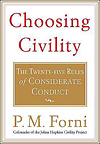Read an Excerpt of Choosing Civility
3 Rules of Civil Behavior

Dr. P.M. Forni is the co-founder of the Johns Hopkins Civility Project and the author of The Civility Solution.
1. Pay Attention"A human moment occurs anytime two or more people are together, paying attention to one another."
—Edward M. Hallowell
"The principal form that the work of love takes is attention."
—M. Scott Peck
Several middle schoolers are walking down the hall. They are laughing, they are teasing one another, and they are loud. As they walk by a closed classroom door, one of them does the unexpected. Only a few seconds ago she seemed oblivious to anything but the microcosm of her giggling peers. But now, as she glances at the closed door, the thought that a class or an exam may be taking place behind it flashes through her mind. Immediately she lowers her voice and hastens to hush her friends.
A small act? Yes, but an impressive one nonetheless. First, the young woman managed to see in her mind's eye what may have been happening beyond the closed door; then, she was able to imagine the discomfort that her group's noisemaking could cause; finally, she was willing to act upon her empathic imagination. This complex process, however, could not have started had she not been aware of her surroundings. She could be considerate because she was paying attention.
Without attention, no meaningful interaction is possible. Our first responsibility, when we are with others, is to pay attention, to attend to. Etymology tells us that attention has to do with "turning toward," "extending toward," "stretching." Thus attention is a tension connecting us to the world around us. Only after we notice the world can we begin to care for it. Every act of kindness is, first of all, an act of attention. We may see a coworker in need of a word of encouragement, but it is only if we pay attention that we may do something about it. We may hear a child cry, but again, our help is contingent upon our stopping and taking notice.
We spend much of our daily lives neglecting to pay attention. I know I often go through my surroundings without taking them in, without making them mine. When I drive from home to the office and back along my well-traveled route, rarely is my attention struck by the individual objects of the world around me. Rather, my glance is trapped by the patina of the familiar covering them. A tree is nothing but a tree, a storefront just another storefront, a bus just a bus, a passerby just a passerby. Nothing interesting there.
I believe we are all familiar with this kind of experience, just as we are acquainted with its opposite. We also are able to relate to the world as a new and interesting place, as something worthy of attention. Sometimes we need a special occasion to do so. Now I am covering the same stretch of road I cover every day, but this time a friend visiting from out of town is with me. As I point out the sights to him, my perception becomes keener and the familiar turns slightly unfamiliar. I manage to see what I see every day as if for the first time. The tree becomes an old dogwood. A handsome calico cat sleeps in the storefront's window. The bus roaring by flashes a destination that reminds me of a resort I loved as a child. And the passerby is a middle-aged, seemingly upset woman pressing a white handkerchief to her mouth. What have I been doing? I have been looking at my everyday world through the eyes of the stranger. I have stripped reality of its generic wrapper. I have been paying attention.
Excerpted from P.M. Forni's Choosing Civility: The Twenty-Five Rules of Considerate Conduct © 2002 by P.M. Forni. All rights reserved. Reprinted with permission from St. Martin's Press.



